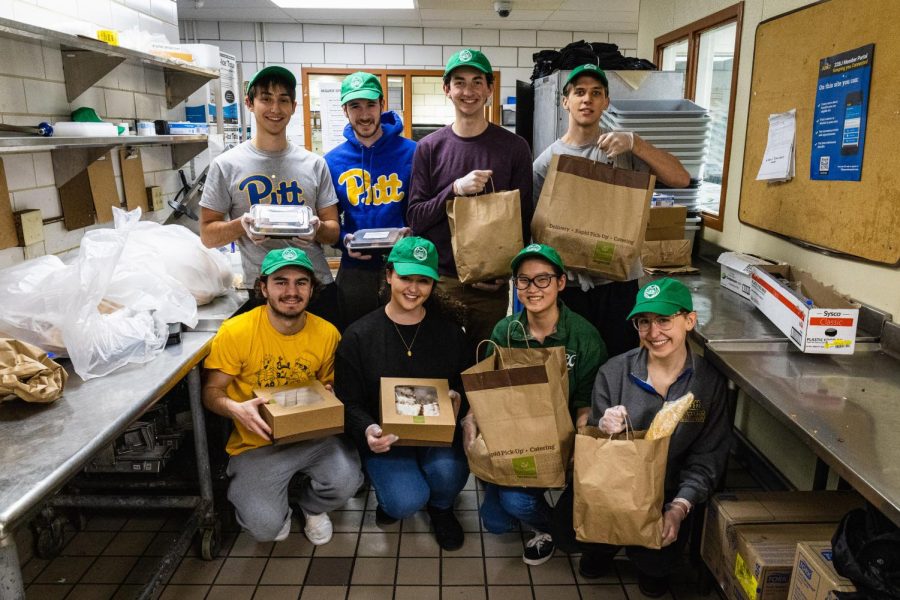Pitt Food Recovery Heroes saves more than 1,500 pounds of food this semester
Ethan Shulman | Senior Staff Photographer
Members of Food Recovery Heroes pose for a photo in the Eatery Tuesday afternoon.
March 15, 2023
With a mission to combat food insecurity and reduce food waste, Pitt Food Recovery Heroes has already recovered 1,592 pounds of food this spring and plans to continue reducing food waste one pound of pastries and packaged meals at a time.
Food Recovery Heroes is a student-run organization that recovers food from Pitt dining locations weekly and donates meals to groups like Pitt Pantry and Family House. Every Tuesday through Friday, students can sign up to wrap leftover foods from dining locations like the Eatery and Einstein Bros. for donations and transport.
Pittsburgh produces almost 90,000 tons of food waste each year and has an estimated food insecurity rate of 19.4%.
After the difficult impacts of COVID-19, the organization worked diligently last semester to increase club membership, recovery locations and raise awareness about the impacts of food waste. Emily Kuntz, vice president of marketing for Food Recovery Heroes, said the team recovered 900 pounds of food last fall and has already branched out to new locations this spring.
“This semester, we did start doing Peterson Events Center recoveries, the basketball games, which is really exciting because they did do that in the past,” Kuntz, a junior digital narrative and interactive design major, said.
Gal Yovel, the group’s president, also shared that last fall was a “growing semester” for the organization. Yovel and other student board members worked to build stronger relationships with the University, food donation centers and other student volunteers.
“Growing last semester really helped drive the organization for this semester as the relationships that we formed helped us have a really exciting partnership with Pitt Eats and the Pitt Pantry,” Yovel, a sophomore neuroscience major, said.
After her first recovery mission at Family House three years ago, Kuntz has witnessed the growth and impact the organization brings to the community.
“To see where it’s gone, and all the different people we’re working with now, has been really cool,” Kuntz said.
While Food Recovery Heroes saves leftover meals at Pitt dining halls, students and staff still contribute to the more than 22 million pounds of food thrown out by universities each year.
Josh Weiland, senior director of distribution programs at 412 Food Rescue, said eating locally and meal prepping are just a few ways to work against food waste. He also said composting is a “great avenue” to reduce food waste and has many commercial opportunities in the Pittsburgh area.
“At times, it’s also recognizing that the things that we can do are not necessarily inventive, cutting-edge technologies,” Weiland said, “but also understanding how to better utilize existing technologies or retrofit them to our use, and just taking advantage of those.”
Although food at the dining hall can seem appetizing at first glance, Kuntz recommends to refrain from piling up your plate with numerous options at once. She said using a smaller plate also helps reduce food waste.
“You can always get more. You can’t get less,” Kuntz said. “Once that food was on your plate, if you don’t eat it, it’s wasted.”
In a city that produces more than 90,000 tons of food waste each year, Yovel appreciates the organization’s continuous message to spread sustainability and community engagement across campus.
“Not only does volunteering through FRH help reduce food waste here on campus, but it has given me the ability to help other students through bringing food to the Pitt Pantry and people in the local community through the food banks that we work with,” Yovel said.
Kuntz said she joined Food Recovery Heroes after hearing about Pittsburgh’s food insecurity problem. She appreciates the opportunity to target the issue hands-on through food recoveries and donations.
“I think that’s great to help a larger cause, but it’s also community centered and it’s nice to give back to that, especially like the pantry and stuff, that’s directly helping students and community members,” Kuntz said.



